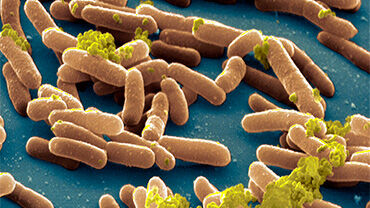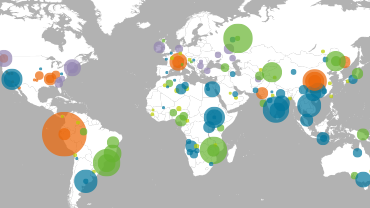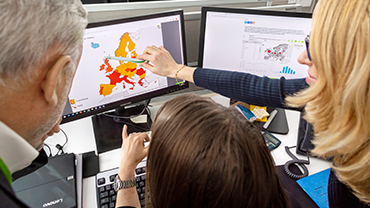Clusters of Salmonella Enteritidis linked to consumption of chicken meat detected in 11 EU/EEA countries
Two sub-clusters of endemic Salmonella Enteritidis ST11 have been detected with at least 134 human cases identified in 11 EU/EEA countries. Most cases were reported between January and August 2023. Available information from patient interviews in Austria and Denmark suggests chicken meat as a possible vehicle of infection. In Germany, patient interviews have started.
In July 2023, Denmark reported a microbiological cluster of Salmonella Enteritidis ST11 infections with sampling dates starting in May. By 25 August 2023, 97 cases with recent (2023) or historical isolates, that were closely related genetically, were reported in Austria (6), Belgium (6), Denmark (22), Finland (5), France (19), Germany (1), Ireland (12), the Netherlands (12), Norway (9), Slovenia (3), and Sweden (2). In Denmark, the majority of 19 interviewed cases reported consumption of kebab or pizza that may have had chicken as an ingredient, before developing symptoms. In Austria, two of the five interviewed cases reported eating chicken kebabs within seven days before the onset of symptoms and two cases reported eating other chicken dishes (chicken burrito and chicken schnitzel).
In early August 2023, Austria reported a cluster of Salmonella Enteritidis ST11 infections, which resulted in one death. The disease onset of the first case in this cluster was reported to be in mid-March with the latest onset date in mid-July 2023. By 25 August 2023, 8 cases were recorded in Austria and five of eight interviewed cases reported consumption of chicken kebab mea shortly before the onset of symptoms. Additional cases with isolates that were closely related genetically were reported in France (10), Germany (10), Norway (3), Slovenia (2) and Sweden (4), giving the total number of cases in this cluster to 37.
In the Danish cluster, ages ranged from 10 to 98 years while ages ranged from 5 to 75 years in the Austrian cluster. In both clusters, females and males were affected but males were predominant in Austria (86%) and Germany (71%).
The majority of tested isolates have genetic changes that cause resistance to ciprofloxacin. Many cases of Salmonella infection do not need antibiotic treatment, but when treatment is required, ciprofloxacin is often used. As ciprofloxacin is not suitable for treatment of infection in these cases, other antibiotics must be used.
The two clusters represent only a proportion of all S. Enteritidis ST11 infections and these strains continue to pose a risk for infections in the whole EU/EEA population until sources in the food chain are properly investigated and controlled.
Thorough cooking of meat and poultry and avoiding cross contamination from uncooked meat to ready-to-eat food are vital to prevent infection with Salmonella and other foodborne organisms. This is especially important for vulnerable individuals, including the very young, the elderly, and those with weakened immune systems.
Countries are encouraged to report related cases through EpiPulse events 2023-FWD-00045 and 2023-FWD-00048 and to strengthen their collaboration for foodborne outbreak investigations between public health, food safety, and veterinary authorities.
Background information
Poultry and egg products have been identified as sources of cross-border foodborne outbreaks caused by various S. Enteritidis ST11 strains, involving over 2200 cases. In 2021, ECDC and European Food Safety Agency (EFSA) published a joint Rapid Outbreak Assessment (ROA) on a multi-country outbreak of S. Enteritidis ST11 linked to poultry products. In 2020 and 2022, two ROAs were published on multi-country outbreaks of S. Enteritidis ST11 linked to eggs and egg products, showing prolonged circulation of this clone in the EU/EEA since 2013.
Various animals (especially poultry, pigs, cattle, and reptiles) can be reservoirs for Salmonella, and humans generally become infected (and develop salmonellosis) by eating poorly cooked, contaminated food or by eating food that has been contaminated by uncooked meat and poultry. The incubation period is 12-36 hours and the severity of illness depends on the number of bacteria ingested, the immune status of the person, and the type of Salmonella. The clinical picture of salmonellosis is characterised by fever, diarrhoea, abdominal pain, nausea and vomiting but can sometimes lead to blood stream infection, and a more severe, systemic form of the disease. Symptoms usually last for a few days and most infections are self-limiting. Children, the elderly and persons with chronic diseases are most vulnerable for severe infections and because of dehydration or invasive infections, hospital admission may sometimes be required. Deaths due to Salmonella infection are uncommon but can occur in young babies and infants, older people, and individuals with weakened immune systems.







